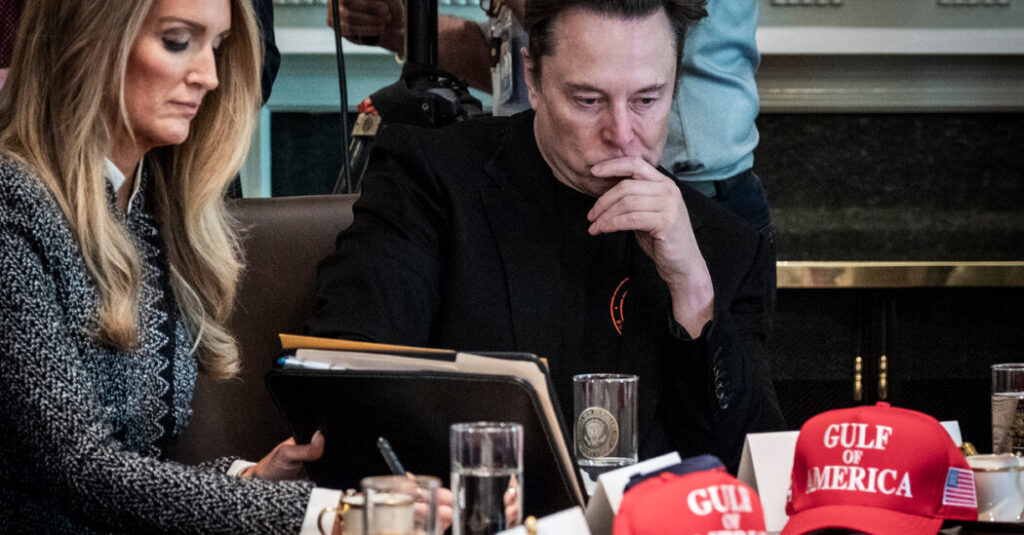Seated at the head of a large conference table inside the West Wing’s Roosevelt Room on Wednesday afternoon, Elon Musk, dressed in his signature T-shirt and blazer, ducked the question of whether his Department of Government Efficiency would meet his pledge of slashing $1 trillion from the federal budget.
“I think it’s possible to do that, but it’s a long road to go, and, you know, it’s really difficult,” he said of the trillion-dollar goal. “It’s sort of, how much pain is, you know, are the cabinet and is Congress willing to take? Because it can be done, but it requires dealing with a lot of complaints.”
His caginess contrasted with his chest-thumping confidence just a few months ago about what he would accomplish in government. Standing onstage at a Trump rally at Madison Square Garden in October, Mr. Musk told a roaring crowd that he could cut “at least two trillion” in federal spending. He later halved that figure.
Now, Mr. Musk, who never previously served in government, has been forced to revise his expectations even further, though he still insists his goals remain technically possible. His 101 days in government have been stormy, and his series of interviews this week — including Wednesday’s session with reporters from major newspapers and television networks — appeared to be an effort to wrest back control of the messaging.
He has clashed with cabinet secretaries and fielded complaints from lawmakers whose constituents’ services and jobs were threatened by cuts from his Department of Government Efficiency. He has argued with the president over tariffs and faced protests from federal employees, including over his decision to dismantle entire agencies, including the U.S. Agency for International Development and the Consumer Financial Protection Bureau.
He has also run into a math problem that budget experts from both parties warned about: There is no way to slash a trillion dollars without tackling the most politically sensitive parts of the budget, social safety net programs and military spending.
The billionaire says he is proud of the cuts DOGE has made. He says he plans to return to spending most of his time working on his companies, which include Tesla, X and SpaceX, but expects to devote around two days a week to government work, visiting Washington every other week.
DOGE was originally intended to operate only until July 4, 2026, but Mr. Musk said he could imagine the effort running through the entire four years of the Trump administration. He said it would be up to President Trump to decide how long he wanted him to keep working on the initiative. Mr. Musk is allowed to serve just 130 days as a “special government employee,” but if he reduces his hours to part time, he could extend by months his time working for the Trump administration.
Mr. Musk insisted that DOGE would do well in his absence. But he was evasive, resorting to jokes, when asked who would fill his place.
“DOGE is a way of life. Like Buddhism,” Mr. Musk said.
Pressed again, he said: “Is Buddha needed for Buddhism?”
In Mr. Musk’s telling, he has given DOGE, which he compared to a “start-up,” the intensive burst of his attention it required to get it off the ground. Mr. Musk claims to have saved taxpayers $160 billion so far.
But DOGE’s online “wall of receipts” does not account for 64 percent of that total. The group has only itemized $58 billion of its savings by linking them to specific canceled contracts, grants and leases. The other $102 billion is not explained. And even the $58 million in savings that DOGE has itemized is significantly inflated, by including outright errors and guesses about the future.
Mr. Musk said that it was still “absolutely” possible to find $1 trillion in savings to confront the problem of the ballooning national debt, but that it remained to be seen whether there was “sufficient political will in Congress and elsewhere to actually do that.”
“And we may not succeed,” he said.
Mr. Trump has made clear to Mr. Musk that some of the most sizable portions of the federal government are off limits for serious reform. The president has ruled out making any changes to Social Security and Medicare, which account for more than a third of federal spending. And Defense Secretary Pete Hegseth has said he wants the Pentagon budget to be increased to $1 trillion.
At the White House on Wednesday, Mr. Musk reiterated that there were billions more to be saved from cutting waste and that his team had found clear-cut evidence of fraud.
Reflecting on his time in Washington, Mr. Musk shared an unusual amount of detail about his life with Mr. Trump.
“I guess we’re good friends, and we’ll be on Air Force One or Marine One, and he’s like, ‘Hey do you want to stay over?’ And I’m like, ‘Sure,’” Mr. Musk said.
Mr. Musk ended up spending the night in the Lincoln Bedroom on several occasions.
During one of those sleepovers, Mr. Musk said, Mr. Trump called him late at night to tell him to make sure to get some ice cream from the kitchen. The billionaire said he helped himself to a whole container of caramel Häagen-Dazs.
“I was like, this stuff’s amazing,” he said.
David A. Fahrenthold contributed reporting.


